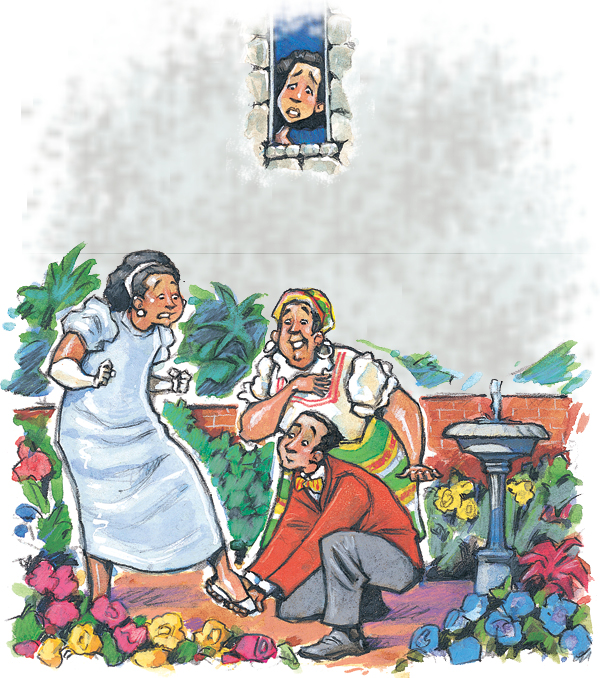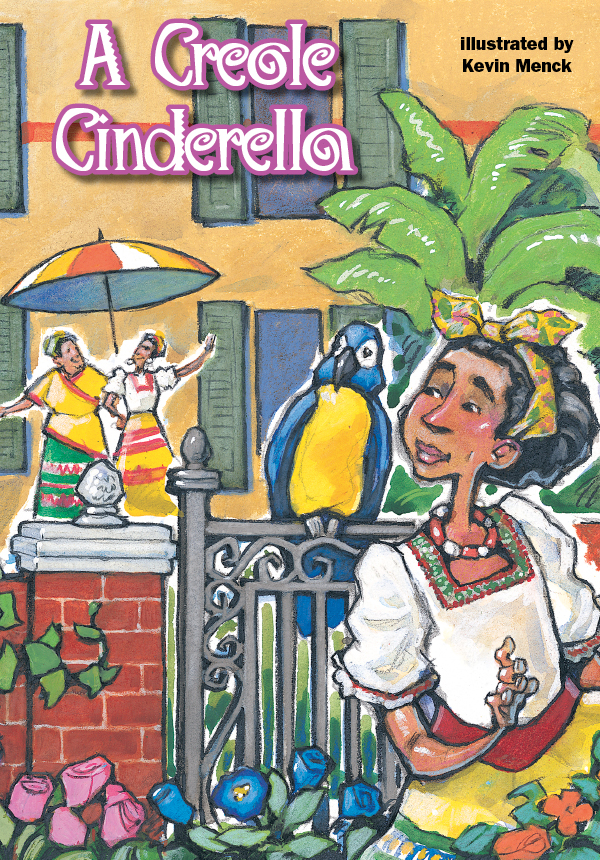A Creole Cinderella
A young woman named Celeste once lived in a fine house in New Orleans. It had a beautiful courtyard with a garden and a black iron gate. Her parents had died; her only real friend was an old parrot, with green feathers. All it could cry was, “Remember! Remember!”
“Yes,” Celeste would reply. “I will remember to be thankful for my good fortune.”
So she often gave coins to the poor who came to her gate. And she liked it when street vendors passed, singing about their goods. One woman sang:
Cantaloupes! Cantaloupes! Sweet to the rind
If you don’t believe me, jest draw up your blind!
I sell to the rich,
I sell to the poor,
I’m gonna sell to the lady
Standin’ in that door.
“Yes,” Celeste said, and bought some.
One morning, she heard voices singing tunelessly:
Beautiful rice fritters,
All hot, all hot, quite hot:
We promise they are good.
Fine rice fritters . . . fine rice fritters.
Celeste saw that two women had set up a little burner to cook fritters. They wore raggedy gingham skirts, badly tied turbans, and dingy aprons. Celeste saw a man take a bite of one fritter, make a face, and toss it back into the skillet. The younger woman began to cry, “What we gonna do? No one buy our sorry fritters.”
“You mix the batter wrong,” said the older woman. “Fine daughter I got, can’t even make a fritter!”
Kindhearted Celeste went and offered to make the mother her housekeeper, and gave the daughter, named Coraline, the job of lady’s maid. They gladly accepted. But the two were schemers, who began to plot how to get too-trusting Celeste’s riches.
The next day, while Celeste visited a sick neighbor, Coraline’s mama went to the big public square, where she bought some “forgettin’” powder.
Celeste, at her neighbor’s, saw a handsome young man in a passing carriage. “Oh!” she exclaimed. “Who is that gentleman?”
“That is Henri Marot, the nephew of Monsieur Marot,” said the neighbor. “He is visiting from France. His uncle hopes he will marry one of the young women hereabouts. Monsieur Marot will give three masked balls to introduce him to the ladies. Surely you will get an invitation, for you are the loveliest of all.”
Celeste blushed at these words. But she was secretly very pleased.
Alas! That night Coraline’s mama sprinkled “forgettin’” powder on Celeste’s food. As soon as she tasted it, Celeste forgot who she was.
“You’re the serving girl,” said the woman. “Now clear these dishes away.”
So Celeste became a servant in her own house.
“Remember! Remember!” urged the parrot in the garden.
But Celeste remembered only that she was a servant.
The next day, an invitation arrived to the masked balls Monsieur Marot was holding for his nephew, Henri. Both Coraline and her mother planned to go; as she washed and dusted and swept, Celeste listened to them chatter about how Coraline would win the young man’s heart.
“Remember! Remember!” the parrot would cry.
“I have nothing — not even a memory — to call my own,” sighed Celeste as she rested from her work beside the gate one morning.
Her sad thoughts were interrupted by an old woman in a raggedy black shawl and red turban, who sang:
Fine eggs, fresh offen the farm,
So fresh from the hen, they still warm!
Buy my breakfas’ eggs today, Lady,
An’ yo’ smile the livelong day, Lady.
Celeste had already bought eggs, but the old woman looked hot and weary and clearly hadn’t sold any eggs. So, kindhearted Celeste bought the basketful.
“A kind heart earn a reward,” said the old woman. “When you sort them eggs, you’ll find a little luck-egg. Plant it like a seed, and you’ll get a surprise.”
Indeed, when she sorted the eggs, Celeste found one no bigger than a marble. She planted the “luck-egg” in a secret corner of the garden.
For days, Celeste was kept running as Coraline and her mother prepared for the first masked ball at Monsieur Marot’s. When they finally went away on an errand, Celeste went to where she had planted the luck-egg.

To her surprise, she found a small tree bearing a lovely crystal fig. The moment she saw it, an idea took shape in her mind. She picked the fruit, left the sleeping household, and went to the finest dressmaker in the city. There, she exchanged the fig for a dress of black velvet studded with glass beads, like the starry night-sky, glass slippers, and a small black mask called a domino.
She had barely returned home, however, when Coraline and her mother demanded that she help them dress for the ball. When they left in the carriage, Celeste put on her new gown, slippers, and mask. She hurried to Monsieur Marot’s house. There, a charmed Henri Marot danced every dance with her. He begged her to remove her mask, but she said, “Not until everyone unmasks at midnight.”
But at the first stroke of twelve, she fled, afraid that she would be punished for pretending to be a grand lady when she was not.
She hid her finery just before an angry Coraline and her angrier mother returned, complaining about the “upstart who ruint the ball fo’ ever’one.”
The next day, while Coraline and her mother fussed over what to wear to the second ball, Celeste found that the egg tree had grown a silver pear. She exchanged this for a gown the color of the Moon, silver slippers, and a silver mask.
The moment the others left, Celeste put on her new things and went to the ball, where Henri Marot recognized the mysterious lady. Again he danced each dance with her; again she refused to remove her mask. Just as the clock struck twelve, she fled home and hid the slippers, gown, and mask. Soon mother and daughter returned in foul tempers, raging about the “silver-gowned no-’count who put a spell on Henri Marot.”
The next day, before the third and final ball, Celeste found that the little tree had sprouted a golden apple bright as the Sun. For this, the dressmaker gave her a gown of cloth-of-gold, dainty golden slippers, and a golden domino.

That night, she danced every dance with Henri. But when Celeste tried to leave as before, Henri grabbed her hand, and signaled to the musicians to play the old song that goes:
Take this golden ring,
Put it on your finger;
Take this golden ring,
To remember me by.
To Celeste’s surprise, the young man slipped a gold ring on her finger, while cries of disappointment came from all sides — with the loudest from Coraline and her mother. Afraid of their anger if she was found out, Celeste fled, but she stumbled and left one golden slipper behind.
But Coraline followed. She saw the gold-gowned figure slip through the gate of their house. She guessed everything, and later told her mother.
The next day, Henri Marot announced that he would marry the young woman whose foot fit the dainty gold slipper, and who could produce the ring he had given her.
Coraline and her mother locked Celeste in a second-floor room with a single narrow window; they made her hand over the ring. But Coraline’s fingers were too big, so she put the ring in her pocket. Though Celeste refused to tell them where the items where, the two searched until they found the black satin dress with glass beads and the glass slippers. Then they found the silver gown and silver slippers. But they couldn’t find the golden dress or slippers.
“Two outta three’ll do,” said the mother. Then she sent a message to Henri Marot telling him that Coraline was his lost love.
When Henri Marot knocked at the door, Coraline’s mother ordered, “Go put on one o’ them gowns we found.”
Coraline tried to squeeze into the black velvet gown, but the seams burst; glass beads flew everywhere. However, the seams of the silver gown held; and she was — just barely — able to squash her feet into the silver slippers. Then she went out to greet Henri, who was chatting with her mother in the garden. With painful effort, she scrunched her foot into the gold slipper that Henri had brought. Henri gallantly kissed Coraline’s hand.

Poor Celeste watched through the narrow window of the locked room. But the parrot took the key from the ledge where Coraline’s mother had set it. He flew up and dropped it at the feet of heartbroken Celeste.
Henri asked to see the ring, and was puzzled that Coraline kept it in her pocket, not on her finger. Suddenly, the parrot swooped down, snatched the ring from Coraline’s palm, and flew into a tree.
“Thief!” cried the young woman. “That’s mine!”
But a gentle voice said, “The ring belongs to me.” Celeste stepped into the sunlight, dressed in her cloth-of-gold gown, on her foot a single gold slipper.
Coraline and her mother screeched, “Get back t’ work, you!”
At that moment, Coraline’s foot swelled. The gold slipper flew off and landed in front of Celeste. She immediately slipped it on. Then the parrot flew down, perched on her shoulder, and dropped the ring into her hand. Henri placed it on her finger, saying, “The ring and slipper are back where they belong.”

“Remember! Remember!” the parrot cried. And the “forgettin’” spell on Celeste was broken at that moment. She remembered everything. Seeing that the game was up, Coraline and her mother fled — they were never to be seen again. Celeste and Henri were soon married, and lived happily ever after with the parrot as their companion.

